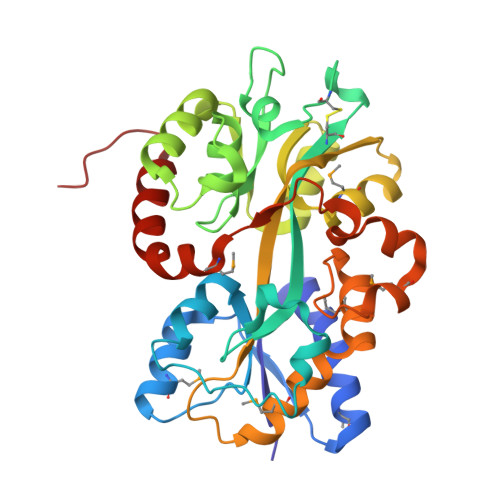Structural basis for selective GABA binding in bacterial pathogens.
Planamente, S., Mondy, S., Hommais, F., Vigouroux, A., Morera, S., Faure, D.(2012) Mol Microbiol 86: 1085-1099
- PubMed: 23043322
- DOI: https://doi.org/10.1111/mmi.12043
- Primary Citation of Related Structures:
4EQ7, 4EUO - PubMed Abstract:
GABA acts as an intercellular signal in eukaryotes and as an interspecies signal in host-microbe interactions. Structural characteristics of selective eukaryotic GABA receptors and bacterial GABA sensors are unknown. Here, we identified the selective GABA-binding protein, called Atu4243, in the plant pathogen Agrobacterium tumefaciens. A constructed atu4243 mutant was affected in GABA transport and in expression of the GABA-regulated functions, including aggressiveness on two plant hosts and degradation of the quorum-sensing signal. The GABA-bound Atu4243 structure at 1.28 Å reveals that GABA adopts a conformation never observed so far and interacts with two key residues, Arg(203) and Asp(226) of which the role in GABA binding and GABA signalling in Agrobacterium has been validated using appropriate mutants. The conformational GABA-analogue trans-4-aminocrotonic acid (TACA) antagonizes GABA activity, suggesting structural similarities between the binding sites of the bacterial sensor Atu4243 and mammalian GABA(C) receptors. Exploration of genomic databases reveals Atu4243 orthologues in several pathogenic and symbiotic proteobacteria, such as Rhizobium, Azospirillum, Burkholderia and Pseudomonas. Thus, this study establishes a structural basis for selective GABA sensors and offers opportunities for deciphering the role of the GABA-mediated communication in several host-pathogen interactions.
- Institut des Sciences du Végétal, CNRS, avenue de la terrasse, 91198, Gif-sur-Yvette, France.
Organizational Affiliation:



















